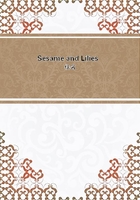
第23章
There is not one restraint you put on a good girl's nature--there is not one check you give to her instincts of affection or of effort--which will not be indelibly written on her features, with a hardness which is all the more painful because it takes away the brightness from the eyes of innocence, and the charm from the brow of virtue.
This for the means: now note the end.
Take from the same poet, in two lines, a perfect description of womanly beauty -"A countenance in which did meet Sweet records, promises as sweet."The perfect loveliness of a woman's countenance can only consist in that majestic peace, which is founded in the memory of happy and useful years,--full of sweet records; and from the joining of this with that yet more majestic childishness, which is still full of change and promise;--opening always--modest at once, and bright, with hope of better things to be won, and to be bestowed. There is no old age where there is still that promise.
Thus, then, you have first to mould her physical frame, and then, as the strength she gains will permit you, to fill and temper her mind with all knowledge and thoughts which tend to confirm its natural instincts of justice, and refine its natural tact of love.
All such knowledge should be given her as may enable her to understand, and even to aid, the work of men: and yet it should be given, not as knowledge,--not as if it were, or could be, for her an object to know; but only to feel, and to judge. It is of no moment, as a matter of pride or perfectness in herself, whether she knows many languages or one; but it is of the utmost, that she should be able to show kindness to a stranger, and to understand the sweetness of a stranger's tongue. It is of no moment to her own worth or dignity that she should be acquainted with this science or that; but it is of the highest that she should be trained in habits of accurate thought; that she should understand the meaning, the inevitableness, and the loveliness of natural laws; and follow at least some one path of scientific attainment, as far as to the threshold of that bitter Valley of Humiliation, into which only the wisest and bravest of men can descend, owning themselves for ever children, gathering pebbles on a boundless shore. It is of little consequence how many positions of cities she knows, or how many dates of events, or names of celebrated persons--it is not the object of education to turn the woman into a dictionary; but it is deeply necessary that she should be taught to enter with her whole personality into the history she reads; to picture the passages of it vitally in her own bright imagination; to apprehend, with her fine instincts, the pathetic circumstances and dramatic relations, which the historian too often only eclipses by his reasoning, and disconnects by his arrangement: it is for her to trace the hidden equities of divine reward, and catch sight, through the darkness, of the fateful threads of woven fire that connect error with retribution. But, chiefly of all, she is to be taught to extend the limits of her sympathy with respect to that history which is being for ever determined as the moments pass in which she draws her peaceful breath; and to the contemporary calamity, which, were it but rightly mourned by her, would recur no more hereafter. She is to exercise herself in imagining what would be the effects upon her mind and conduct, if she were daily brought into the presence of the suffering which is not the less real because shut from her sight.
She is to be taught somewhat to understand the nothingness of the proportion which that little world in which she lives and loves, bears to the world in which God lives and loves;--and solemnly she is to be taught to strive that her thoughts of piety may not be feeble in proportion to the number they embrace, nor her prayer more languid than it is for the momentary relief from pain of her husband or her child, when it is uttered for the multitudes of those who have none to love them,--and is "for all who are desolate and oppressed."Thus far, I think, I have had your concurrence; perhaps you will not be with me in what I believe is most needful for me to say. There IS one dangerous science for women--one which they must indeed beware how they profanely touch--that of theology. Strange, and miserably strange, that while they are modest enough to doubt their powers, and pause at the threshold of sciences where every step is demonstrable and sure, they will plunge headlong, and without one thought of incompetency, into that science in which the greatest men have trembled, and the wisest erred. Strange, that they will complacently and pridefully bind up whatever vice or folly there is in them, whatever arrogance, petulance, or blind incomprehensiveness, into one bitter bundle of consecrated myrrh.
Strange, in creatures born to be Love visible, that where they can know least, they will condemn, first, and think to recommend themselves to their Master, by crawling up the steps of His judgment-throne to divide it with Him. Strangest of all that they should think they were led by the Spirit of the Comforter into habits of mind which have become in them the unmixed elements of home discomfort; and that they dare to turn the Household Gods of Christianity into ugly idols of their own;--spiritual dolls, for them to dress according to their caprice; and from which their husbands must turn away in grieved contempt, lest they should be shrieked at for breaking them.